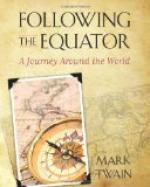“Fell in with Lall Sing Subahdar and his family, consisting of nine persons. Traveled with them two days, and the third put them all to death except the two children, little boys of one and a half years old.”
There it stops. What did they do with those poor little fellows? What was their subsequent history? Did they purpose training them up as Thugs? How could they take care of such little creatures on a march which stretched over several months? No one seems to have cared to ask any questions about the babies. But I do wish I knew.
One would be apt to imagine that the Thugs were utterly callous, utterly destitute of human feelings, heartless toward their own families as well as toward other people’s; but this was not so. Like all other Indians, they had a passionate love for their kin. A shrewd British officer who knew the Indian character, took that characteristic into account in laying his plans for the capture of Eugene Sue’s famous Feringhea. He found out Feringhea’s hiding-place, and sent a guard by night to seize him, but the squad was awkward and he got away. However, they got the rest of the family—the mother, wife, child, and brother—and brought them to the officer, at Jubbulpore; the officer did not fret, but bided his time: “I knew Feringhea would not go far while links so dear to him were in my hands.” He was right. Feringhea knew all the danger he was running by staying in the neighborhood, still he could not tear himself away. The officer found that he divided his time between five villages where be had relatives and friends who could get news for him from his family in Jubbulpore jail; and that he never slept two consecutive nights in the same village. The officer traced out his several haunts, then pounced upon all the five villages on the one night and at the same hour, and got his man.
Another example of family affection. A little while previously to the capture of Feringhea’s family, the British officer had captured Feringhea’s foster-brother, leader of a gang of ten, and had tried the eleven and condemned them to be hanged. Feringhea’s captured family arrived at the jail the day before the execution was to take place. The foster-brother, Jhurhoo, entreated to be allowed to see the aged mother and the others. The prayer was granted, and this is what took place—it is the British officer who speaks:
“In the morning, just before going to the scaffold, the interview took place before me. He fell at the old woman’s feet and begged that she would relieve him from the obligations of the milk with which she had nourished him from infancy, as he was about to die before he could fulfill any of them. She placed her hands on his head, and he knelt, and she said she forgave him all, and bid him die like a man.”
If a capable artist should make a picture of it, it would be full of dignity and solemnity and pathos;




